Research Proposal: Cultural Effects on UK International Accounting
VerifiedAdded on 2023/01/16
|13
|3101
|29
Project
AI Summary
This research proposal investigates the influence of culture on international enterprise management within the UK accounting profession. The study aims to determine the impact of culture on international management, identify its integration within the UK accounting sector, ascertain challenges and barriers arising from cultural differences, and recommend solutions to overcome these obstacles. The proposal employs a systematic literature review, examining the understanding of culture in corporate settings, its influence on international management, and the challenges stemming from cultural diversity. Key themes include the importance of grasping cultural differences, the impact of cultural clashes in international business, and the need for measures such as cross-cultural training and promoting cultural appreciation to overcome challenges. The research will use a qualitative research approach, incorporating interpretivism to analyze theoretical concepts and the human aspects of cultural impact, focusing on data collection through secondary sources to draw meaningful conclusions. The study emphasizes the need for organizations to adapt and foster communication to effectively manage cultural diversity in the global business environment.
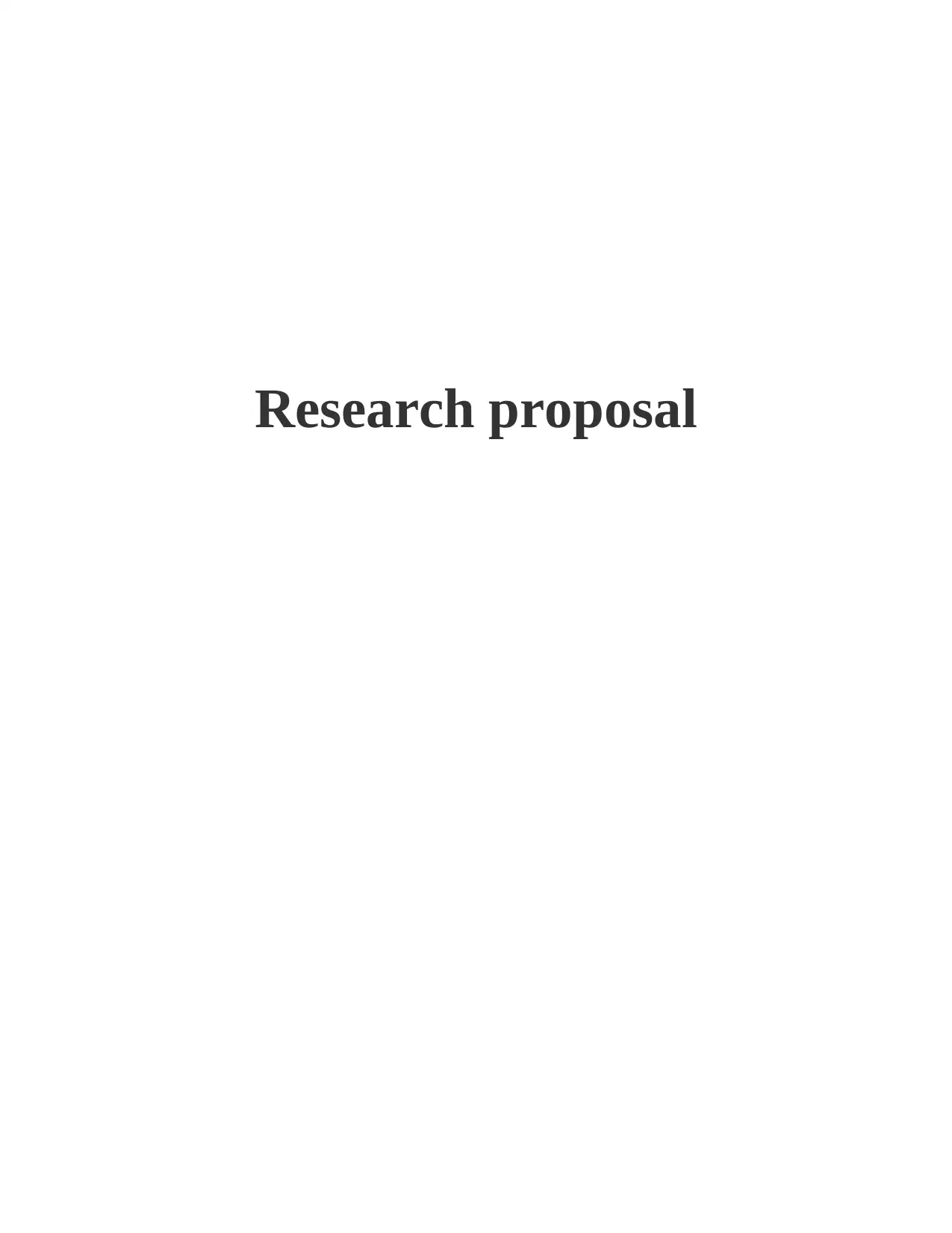
Research proposal
Paraphrase This Document
Need a fresh take? Get an instant paraphrase of this document with our AI Paraphraser
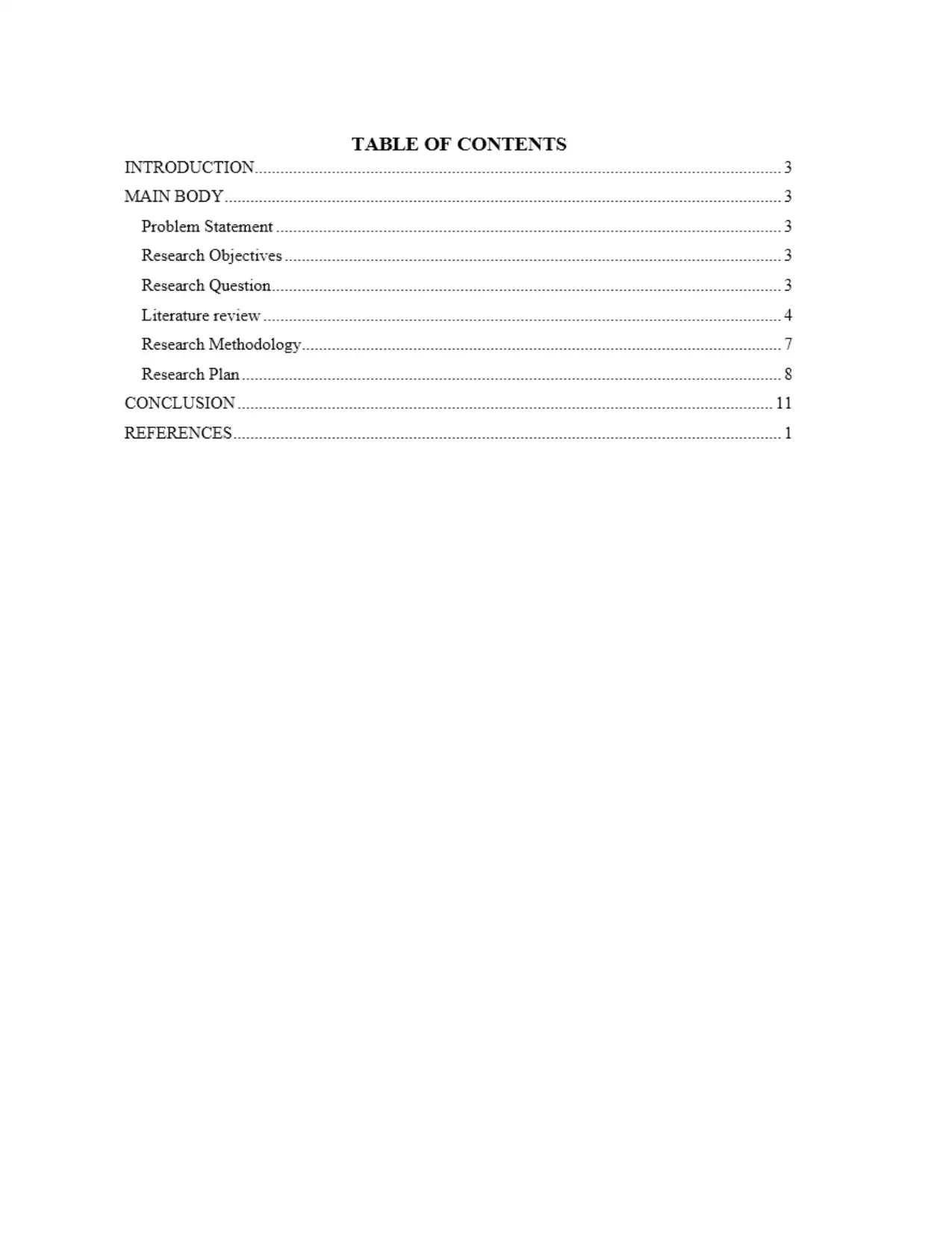
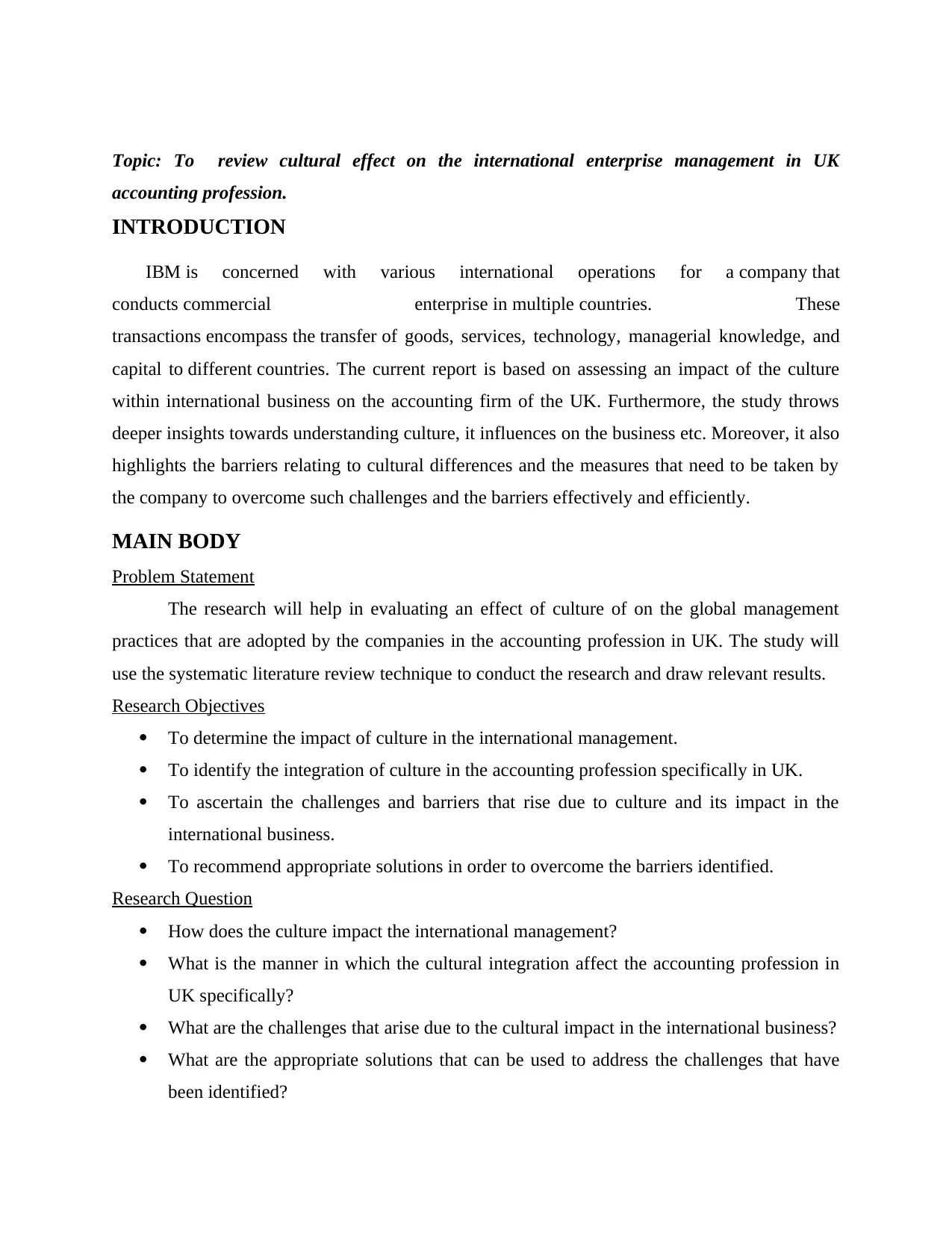
Topic: To review cultural effect on the international enterprise management in UK
accounting profession.
INTRODUCTION
IBM is concerned with various international operations for a company that
conducts commercial enterprise in multiple countries. These
transactions encompass the transfer of goods, services, technology, managerial knowledge, and
capital to different countries. The current report is based on assessing an impact of the culture
within international business on the accounting firm of the UK. Furthermore, the study throws
deeper insights towards understanding culture, it influences on the business etc. Moreover, it also
highlights the barriers relating to cultural differences and the measures that need to be taken by
the company to overcome such challenges and the barriers effectively and efficiently.
MAIN BODY
Problem Statement
The research will help in evaluating an effect of culture of on the global management
practices that are adopted by the companies in the accounting profession in UK. The study will
use the systematic literature review technique to conduct the research and draw relevant results.
Research Objectives
To determine the impact of culture in the international management.
To identify the integration of culture in the accounting profession specifically in UK.
To ascertain the challenges and barriers that rise due to culture and its impact in the
international business.
To recommend appropriate solutions in order to overcome the barriers identified.
Research Question
How does the culture impact the international management?
What is the manner in which the cultural integration affect the accounting profession in
UK specifically?
What are the challenges that arise due to the cultural impact in the international business?
What are the appropriate solutions that can be used to address the challenges that have
been identified?
accounting profession.
INTRODUCTION
IBM is concerned with various international operations for a company that
conducts commercial enterprise in multiple countries. These
transactions encompass the transfer of goods, services, technology, managerial knowledge, and
capital to different countries. The current report is based on assessing an impact of the culture
within international business on the accounting firm of the UK. Furthermore, the study throws
deeper insights towards understanding culture, it influences on the business etc. Moreover, it also
highlights the barriers relating to cultural differences and the measures that need to be taken by
the company to overcome such challenges and the barriers effectively and efficiently.
MAIN BODY
Problem Statement
The research will help in evaluating an effect of culture of on the global management
practices that are adopted by the companies in the accounting profession in UK. The study will
use the systematic literature review technique to conduct the research and draw relevant results.
Research Objectives
To determine the impact of culture in the international management.
To identify the integration of culture in the accounting profession specifically in UK.
To ascertain the challenges and barriers that rise due to culture and its impact in the
international business.
To recommend appropriate solutions in order to overcome the barriers identified.
Research Question
How does the culture impact the international management?
What is the manner in which the cultural integration affect the accounting profession in
UK specifically?
What are the challenges that arise due to the cultural impact in the international business?
What are the appropriate solutions that can be used to address the challenges that have
been identified?
⊘ This is a preview!⊘
Do you want full access?
Subscribe today to unlock all pages.

Trusted by 1+ million students worldwide
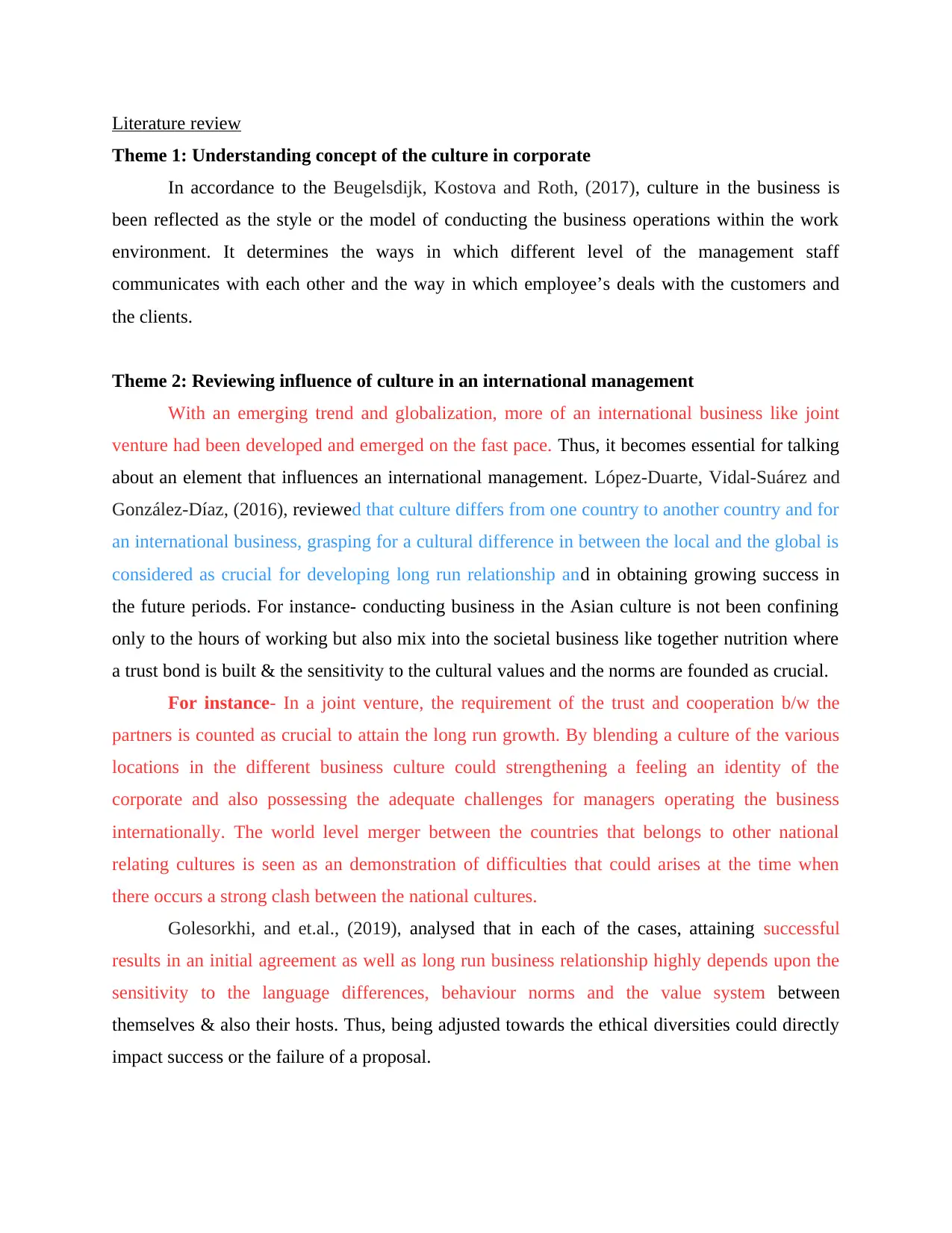
Literature review
Theme 1: Understanding concept of the culture in corporate
In accordance to the Beugelsdijk, Kostova and Roth, (2017), culture in the business is
been reflected as the style or the model of conducting the business operations within the work
environment. It determines the ways in which different level of the management staff
communicates with each other and the way in which employee’s deals with the customers and
the clients.
Theme 2: Reviewing influence of culture in an international management
With an emerging trend and globalization, more of an international business like joint
venture had been developed and emerged on the fast pace. Thus, it becomes essential for talking
about an element that influences an international management. López‐Duarte, Vidal‐Suárez and
González‐Díaz, (2016), reviewed that culture differs from one country to another country and for
an international business, grasping for a cultural difference in between the local and the global is
considered as crucial for developing long run relationship and in obtaining growing success in
the future periods. For instance- conducting business in the Asian culture is not been confining
only to the hours of working but also mix into the societal business like together nutrition where
a trust bond is built & the sensitivity to the cultural values and the norms are founded as crucial.
For instance- In a joint venture, the requirement of the trust and cooperation b/w the
partners is counted as crucial to attain the long run growth. By blending a culture of the various
locations in the different business culture could strengthening a feeling an identity of the
corporate and also possessing the adequate challenges for managers operating the business
internationally. The world level merger between the countries that belongs to other national
relating cultures is seen as an demonstration of difficulties that could arises at the time when
there occurs a strong clash between the national cultures.
Golesorkhi, and et.al., (2019), analysed that in each of the cases, attaining successful
results in an initial agreement as well as long run business relationship highly depends upon the
sensitivity to the language differences, behaviour norms and the value system between
themselves & also their hosts. Thus, being adjusted towards the ethical diversities could directly
impact success or the failure of a proposal.
Theme 1: Understanding concept of the culture in corporate
In accordance to the Beugelsdijk, Kostova and Roth, (2017), culture in the business is
been reflected as the style or the model of conducting the business operations within the work
environment. It determines the ways in which different level of the management staff
communicates with each other and the way in which employee’s deals with the customers and
the clients.
Theme 2: Reviewing influence of culture in an international management
With an emerging trend and globalization, more of an international business like joint
venture had been developed and emerged on the fast pace. Thus, it becomes essential for talking
about an element that influences an international management. López‐Duarte, Vidal‐Suárez and
González‐Díaz, (2016), reviewed that culture differs from one country to another country and for
an international business, grasping for a cultural difference in between the local and the global is
considered as crucial for developing long run relationship and in obtaining growing success in
the future periods. For instance- conducting business in the Asian culture is not been confining
only to the hours of working but also mix into the societal business like together nutrition where
a trust bond is built & the sensitivity to the cultural values and the norms are founded as crucial.
For instance- In a joint venture, the requirement of the trust and cooperation b/w the
partners is counted as crucial to attain the long run growth. By blending a culture of the various
locations in the different business culture could strengthening a feeling an identity of the
corporate and also possessing the adequate challenges for managers operating the business
internationally. The world level merger between the countries that belongs to other national
relating cultures is seen as an demonstration of difficulties that could arises at the time when
there occurs a strong clash between the national cultures.
Golesorkhi, and et.al., (2019), analysed that in each of the cases, attaining successful
results in an initial agreement as well as long run business relationship highly depends upon the
sensitivity to the language differences, behaviour norms and the value system between
themselves & also their hosts. Thus, being adjusted towards the ethical diversities could directly
impact success or the failure of a proposal.
Paraphrase This Document
Need a fresh take? Get an instant paraphrase of this document with our AI Paraphraser
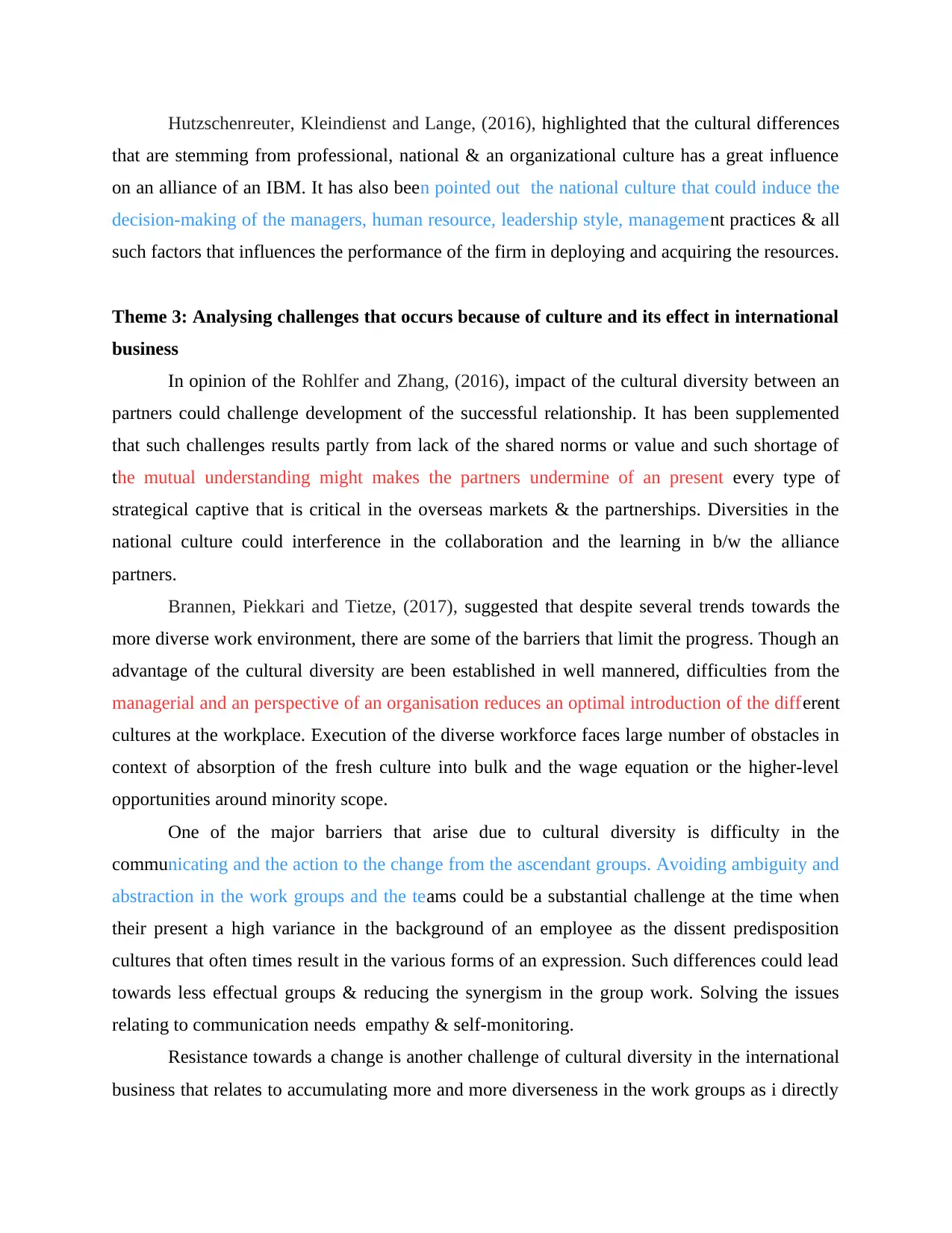
Hutzschenreuter, Kleindienst and Lange, (2016), highlighted that the cultural differences
that are stemming from professional, national & an organizational culture has a great influence
on an alliance of an IBM. It has also been pointed out the national culture that could induce the
decision-making of the managers, human resource, leadership style, management practices & all
such factors that influences the performance of the firm in deploying and acquiring the resources.
Theme 3: Analysing challenges that occurs because of culture and its effect in international
business
In opinion of the Rohlfer and Zhang, (2016), impact of the cultural diversity between an
partners could challenge development of the successful relationship. It has been supplemented
that such challenges results partly from lack of the shared norms or value and such shortage of
the mutual understanding might makes the partners undermine of an present every type of
strategical captive that is critical in the overseas markets & the partnerships. Diversities in the
national culture could interference in the collaboration and the learning in b/w the alliance
partners.
Brannen, Piekkari and Tietze, (2017), suggested that despite several trends towards the
more diverse work environment, there are some of the barriers that limit the progress. Though an
advantage of the cultural diversity are been established in well mannered, difficulties from the
managerial and an perspective of an organisation reduces an optimal introduction of the different
cultures at the workplace. Execution of the diverse workforce faces large number of obstacles in
context of absorption of the fresh culture into bulk and the wage equation or the higher-level
opportunities around minority scope.
One of the major barriers that arise due to cultural diversity is difficulty in the
communicating and the action to the change from the ascendant groups. Avoiding ambiguity and
abstraction in the work groups and the teams could be a substantial challenge at the time when
their present a high variance in the background of an employee as the dissent predisposition
cultures that often times result in the various forms of an expression. Such differences could lead
towards less effectual groups & reducing the synergism in the group work. Solving the issues
relating to communication needs empathy & self-monitoring.
Resistance towards a change is another challenge of cultural diversity in the international
business that relates to accumulating more and more diverseness in the work groups as i directly
that are stemming from professional, national & an organizational culture has a great influence
on an alliance of an IBM. It has also been pointed out the national culture that could induce the
decision-making of the managers, human resource, leadership style, management practices & all
such factors that influences the performance of the firm in deploying and acquiring the resources.
Theme 3: Analysing challenges that occurs because of culture and its effect in international
business
In opinion of the Rohlfer and Zhang, (2016), impact of the cultural diversity between an
partners could challenge development of the successful relationship. It has been supplemented
that such challenges results partly from lack of the shared norms or value and such shortage of
the mutual understanding might makes the partners undermine of an present every type of
strategical captive that is critical in the overseas markets & the partnerships. Diversities in the
national culture could interference in the collaboration and the learning in b/w the alliance
partners.
Brannen, Piekkari and Tietze, (2017), suggested that despite several trends towards the
more diverse work environment, there are some of the barriers that limit the progress. Though an
advantage of the cultural diversity are been established in well mannered, difficulties from the
managerial and an perspective of an organisation reduces an optimal introduction of the different
cultures at the workplace. Execution of the diverse workforce faces large number of obstacles in
context of absorption of the fresh culture into bulk and the wage equation or the higher-level
opportunities around minority scope.
One of the major barriers that arise due to cultural diversity is difficulty in the
communicating and the action to the change from the ascendant groups. Avoiding ambiguity and
abstraction in the work groups and the teams could be a substantial challenge at the time when
their present a high variance in the background of an employee as the dissent predisposition
cultures that often times result in the various forms of an expression. Such differences could lead
towards less effectual groups & reducing the synergism in the group work. Solving the issues
relating to communication needs empathy & self-monitoring.
Resistance towards a change is another challenge of cultural diversity in the international
business that relates to accumulating more and more diverseness in the work groups as i directly
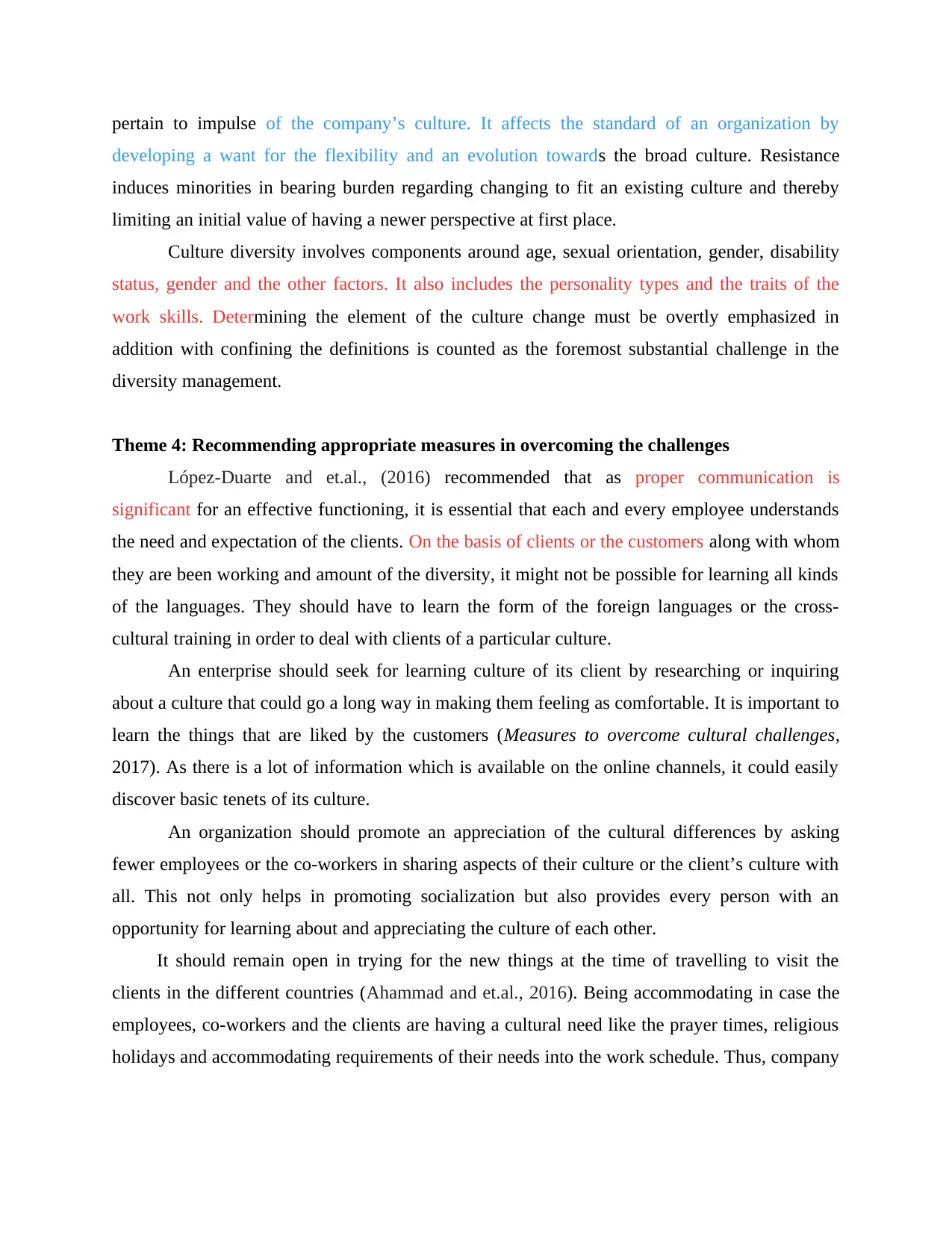
pertain to impulse of the company’s culture. It affects the standard of an organization by
developing a want for the flexibility and an evolution towards the broad culture. Resistance
induces minorities in bearing burden regarding changing to fit an existing culture and thereby
limiting an initial value of having a newer perspective at first place.
Culture diversity involves components around age, sexual orientation, gender, disability
status, gender and the other factors. It also includes the personality types and the traits of the
work skills. Determining the element of the culture change must be overtly emphasized in
addition with confining the definitions is counted as the foremost substantial challenge in the
diversity management.
Theme 4: Recommending appropriate measures in overcoming the challenges
López-Duarte and et.al., (2016) recommended that as proper communication is
significant for an effective functioning, it is essential that each and every employee understands
the need and expectation of the clients. On the basis of clients or the customers along with whom
they are been working and amount of the diversity, it might not be possible for learning all kinds
of the languages. They should have to learn the form of the foreign languages or the cross-
cultural training in order to deal with clients of a particular culture.
An enterprise should seek for learning culture of its client by researching or inquiring
about a culture that could go a long way in making them feeling as comfortable. It is important to
learn the things that are liked by the customers (Measures to overcome cultural challenges,
2017). As there is a lot of information which is available on the online channels, it could easily
discover basic tenets of its culture.
An organization should promote an appreciation of the cultural differences by asking
fewer employees or the co-workers in sharing aspects of their culture or the client’s culture with
all. This not only helps in promoting socialization but also provides every person with an
opportunity for learning about and appreciating the culture of each other.
It should remain open in trying for the new things at the time of travelling to visit the
clients in the different countries (Ahammad and et.al., 2016). Being accommodating in case the
employees, co-workers and the clients are having a cultural need like the prayer times, religious
holidays and accommodating requirements of their needs into the work schedule. Thus, company
developing a want for the flexibility and an evolution towards the broad culture. Resistance
induces minorities in bearing burden regarding changing to fit an existing culture and thereby
limiting an initial value of having a newer perspective at first place.
Culture diversity involves components around age, sexual orientation, gender, disability
status, gender and the other factors. It also includes the personality types and the traits of the
work skills. Determining the element of the culture change must be overtly emphasized in
addition with confining the definitions is counted as the foremost substantial challenge in the
diversity management.
Theme 4: Recommending appropriate measures in overcoming the challenges
López-Duarte and et.al., (2016) recommended that as proper communication is
significant for an effective functioning, it is essential that each and every employee understands
the need and expectation of the clients. On the basis of clients or the customers along with whom
they are been working and amount of the diversity, it might not be possible for learning all kinds
of the languages. They should have to learn the form of the foreign languages or the cross-
cultural training in order to deal with clients of a particular culture.
An enterprise should seek for learning culture of its client by researching or inquiring
about a culture that could go a long way in making them feeling as comfortable. It is important to
learn the things that are liked by the customers (Measures to overcome cultural challenges,
2017). As there is a lot of information which is available on the online channels, it could easily
discover basic tenets of its culture.
An organization should promote an appreciation of the cultural differences by asking
fewer employees or the co-workers in sharing aspects of their culture or the client’s culture with
all. This not only helps in promoting socialization but also provides every person with an
opportunity for learning about and appreciating the culture of each other.
It should remain open in trying for the new things at the time of travelling to visit the
clients in the different countries (Ahammad and et.al., 2016). Being accommodating in case the
employees, co-workers and the clients are having a cultural need like the prayer times, religious
holidays and accommodating requirements of their needs into the work schedule. Thus, company
⊘ This is a preview!⊘
Do you want full access?
Subscribe today to unlock all pages.

Trusted by 1+ million students worldwide
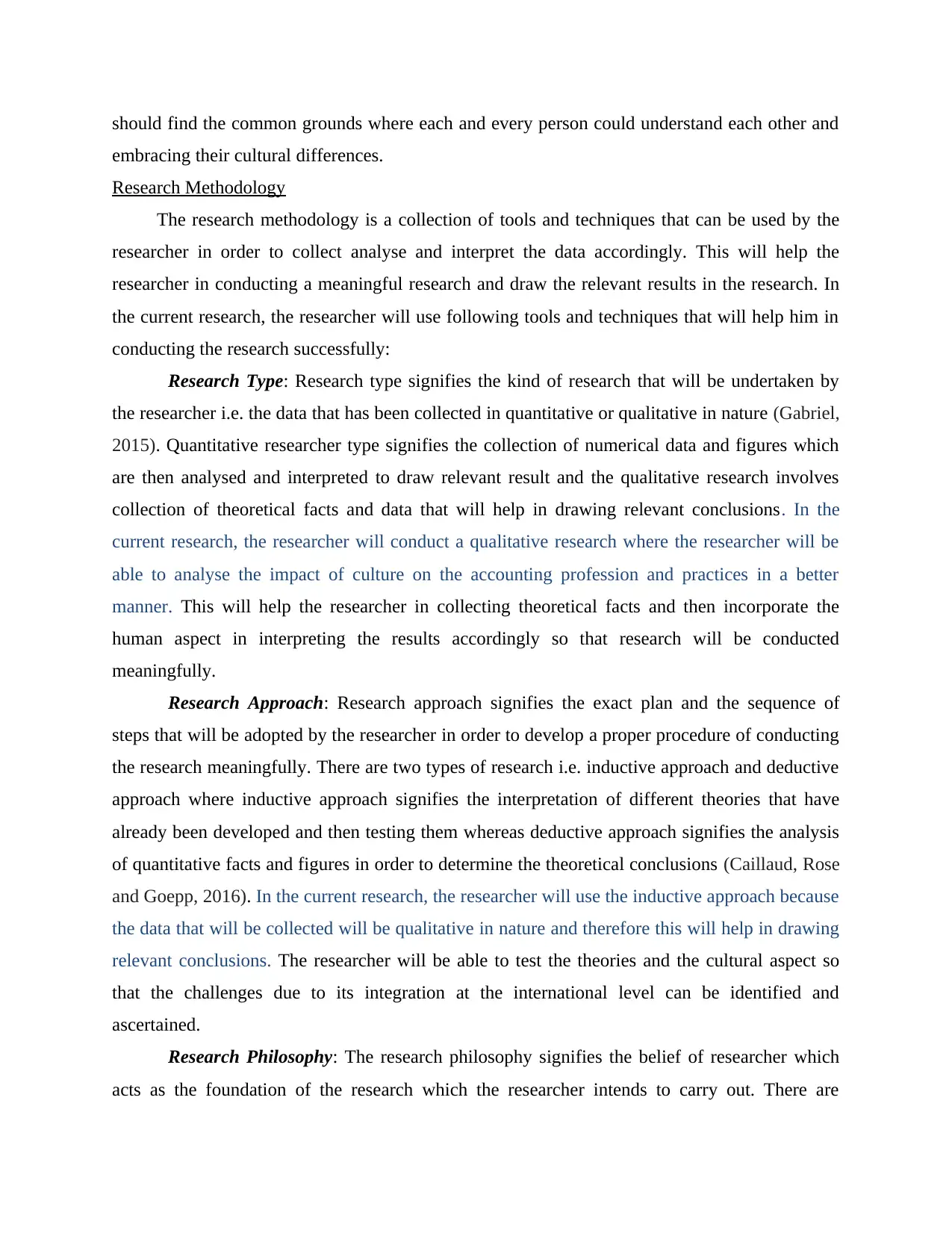
should find the common grounds where each and every person could understand each other and
embracing their cultural differences.
Research Methodology
The research methodology is a collection of tools and techniques that can be used by the
researcher in order to collect analyse and interpret the data accordingly. This will help the
researcher in conducting a meaningful research and draw the relevant results in the research. In
the current research, the researcher will use following tools and techniques that will help him in
conducting the research successfully:
Research Type: Research type signifies the kind of research that will be undertaken by
the researcher i.e. the data that has been collected in quantitative or qualitative in nature (Gabriel,
2015). Quantitative researcher type signifies the collection of numerical data and figures which
are then analysed and interpreted to draw relevant result and the qualitative research involves
collection of theoretical facts and data that will help in drawing relevant conclusions. In the
current research, the researcher will conduct a qualitative research where the researcher will be
able to analyse the impact of culture on the accounting profession and practices in a better
manner. This will help the researcher in collecting theoretical facts and then incorporate the
human aspect in interpreting the results accordingly so that research will be conducted
meaningfully.
Research Approach: Research approach signifies the exact plan and the sequence of
steps that will be adopted by the researcher in order to develop a proper procedure of conducting
the research meaningfully. There are two types of research i.e. inductive approach and deductive
approach where inductive approach signifies the interpretation of different theories that have
already been developed and then testing them whereas deductive approach signifies the analysis
of quantitative facts and figures in order to determine the theoretical conclusions (Caillaud, Rose
and Goepp, 2016). In the current research, the researcher will use the inductive approach because
the data that will be collected will be qualitative in nature and therefore this will help in drawing
relevant conclusions. The researcher will be able to test the theories and the cultural aspect so
that the challenges due to its integration at the international level can be identified and
ascertained.
Research Philosophy: The research philosophy signifies the belief of researcher which
acts as the foundation of the research which the researcher intends to carry out. There are
embracing their cultural differences.
Research Methodology
The research methodology is a collection of tools and techniques that can be used by the
researcher in order to collect analyse and interpret the data accordingly. This will help the
researcher in conducting a meaningful research and draw the relevant results in the research. In
the current research, the researcher will use following tools and techniques that will help him in
conducting the research successfully:
Research Type: Research type signifies the kind of research that will be undertaken by
the researcher i.e. the data that has been collected in quantitative or qualitative in nature (Gabriel,
2015). Quantitative researcher type signifies the collection of numerical data and figures which
are then analysed and interpreted to draw relevant result and the qualitative research involves
collection of theoretical facts and data that will help in drawing relevant conclusions. In the
current research, the researcher will conduct a qualitative research where the researcher will be
able to analyse the impact of culture on the accounting profession and practices in a better
manner. This will help the researcher in collecting theoretical facts and then incorporate the
human aspect in interpreting the results accordingly so that research will be conducted
meaningfully.
Research Approach: Research approach signifies the exact plan and the sequence of
steps that will be adopted by the researcher in order to develop a proper procedure of conducting
the research meaningfully. There are two types of research i.e. inductive approach and deductive
approach where inductive approach signifies the interpretation of different theories that have
already been developed and then testing them whereas deductive approach signifies the analysis
of quantitative facts and figures in order to determine the theoretical conclusions (Caillaud, Rose
and Goepp, 2016). In the current research, the researcher will use the inductive approach because
the data that will be collected will be qualitative in nature and therefore this will help in drawing
relevant conclusions. The researcher will be able to test the theories and the cultural aspect so
that the challenges due to its integration at the international level can be identified and
ascertained.
Research Philosophy: The research philosophy signifies the belief of researcher which
acts as the foundation of the research which the researcher intends to carry out. There are
Paraphrase This Document
Need a fresh take? Get an instant paraphrase of this document with our AI Paraphraser
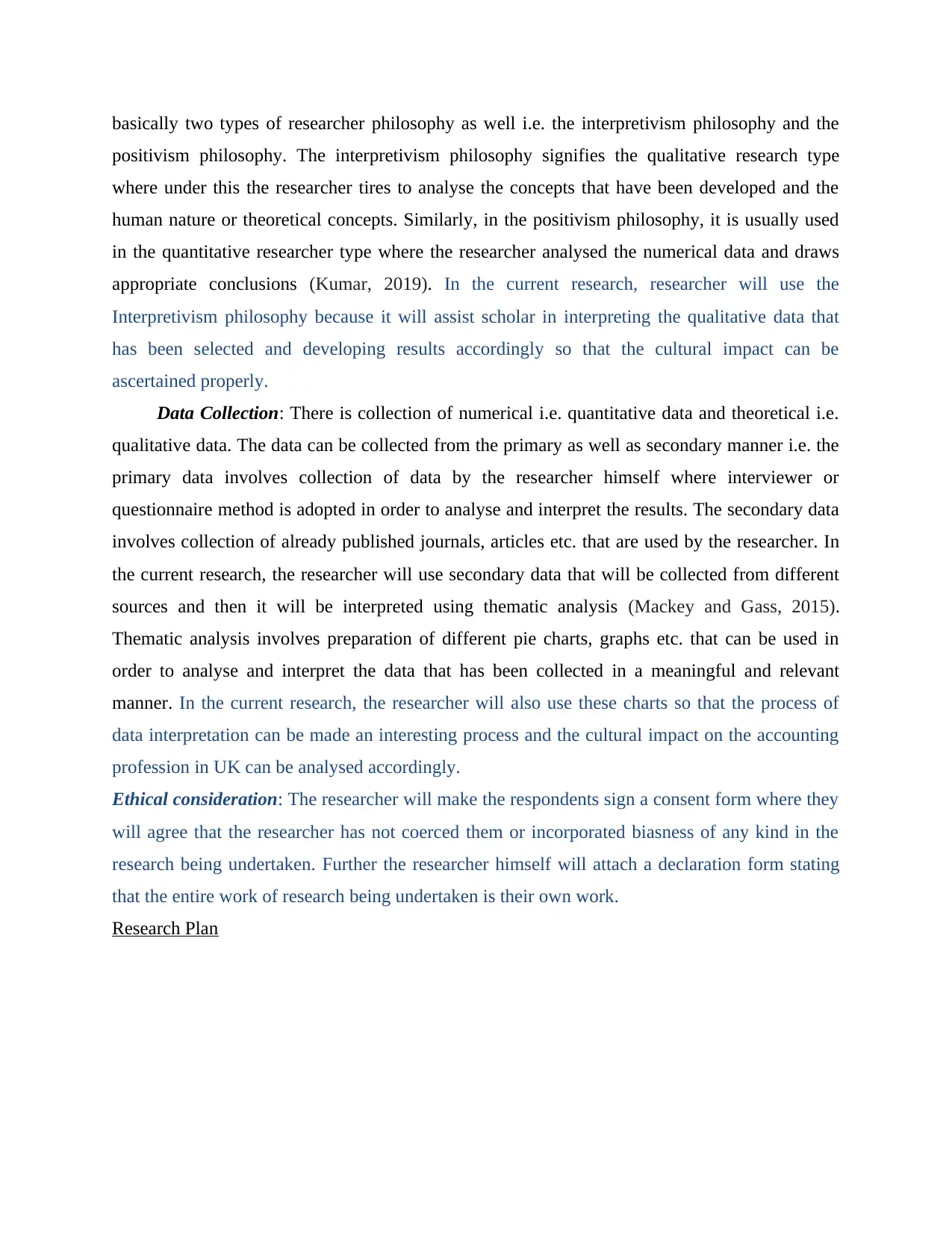
basically two types of researcher philosophy as well i.e. the interpretivism philosophy and the
positivism philosophy. The interpretivism philosophy signifies the qualitative research type
where under this the researcher tires to analyse the concepts that have been developed and the
human nature or theoretical concepts. Similarly, in the positivism philosophy, it is usually used
in the quantitative researcher type where the researcher analysed the numerical data and draws
appropriate conclusions (Kumar, 2019). In the current research, researcher will use the
Interpretivism philosophy because it will assist scholar in interpreting the qualitative data that
has been selected and developing results accordingly so that the cultural impact can be
ascertained properly.
Data Collection: There is collection of numerical i.e. quantitative data and theoretical i.e.
qualitative data. The data can be collected from the primary as well as secondary manner i.e. the
primary data involves collection of data by the researcher himself where interviewer or
questionnaire method is adopted in order to analyse and interpret the results. The secondary data
involves collection of already published journals, articles etc. that are used by the researcher. In
the current research, the researcher will use secondary data that will be collected from different
sources and then it will be interpreted using thematic analysis (Mackey and Gass, 2015).
Thematic analysis involves preparation of different pie charts, graphs etc. that can be used in
order to analyse and interpret the data that has been collected in a meaningful and relevant
manner. In the current research, the researcher will also use these charts so that the process of
data interpretation can be made an interesting process and the cultural impact on the accounting
profession in UK can be analysed accordingly.
Ethical consideration: The researcher will make the respondents sign a consent form where they
will agree that the researcher has not coerced them or incorporated biasness of any kind in the
research being undertaken. Further the researcher himself will attach a declaration form stating
that the entire work of research being undertaken is their own work.
Research Plan
positivism philosophy. The interpretivism philosophy signifies the qualitative research type
where under this the researcher tires to analyse the concepts that have been developed and the
human nature or theoretical concepts. Similarly, in the positivism philosophy, it is usually used
in the quantitative researcher type where the researcher analysed the numerical data and draws
appropriate conclusions (Kumar, 2019). In the current research, researcher will use the
Interpretivism philosophy because it will assist scholar in interpreting the qualitative data that
has been selected and developing results accordingly so that the cultural impact can be
ascertained properly.
Data Collection: There is collection of numerical i.e. quantitative data and theoretical i.e.
qualitative data. The data can be collected from the primary as well as secondary manner i.e. the
primary data involves collection of data by the researcher himself where interviewer or
questionnaire method is adopted in order to analyse and interpret the results. The secondary data
involves collection of already published journals, articles etc. that are used by the researcher. In
the current research, the researcher will use secondary data that will be collected from different
sources and then it will be interpreted using thematic analysis (Mackey and Gass, 2015).
Thematic analysis involves preparation of different pie charts, graphs etc. that can be used in
order to analyse and interpret the data that has been collected in a meaningful and relevant
manner. In the current research, the researcher will also use these charts so that the process of
data interpretation can be made an interesting process and the cultural impact on the accounting
profession in UK can be analysed accordingly.
Ethical consideration: The researcher will make the respondents sign a consent form where they
will agree that the researcher has not coerced them or incorporated biasness of any kind in the
research being undertaken. Further the researcher himself will attach a declaration form stating
that the entire work of research being undertaken is their own work.
Research Plan
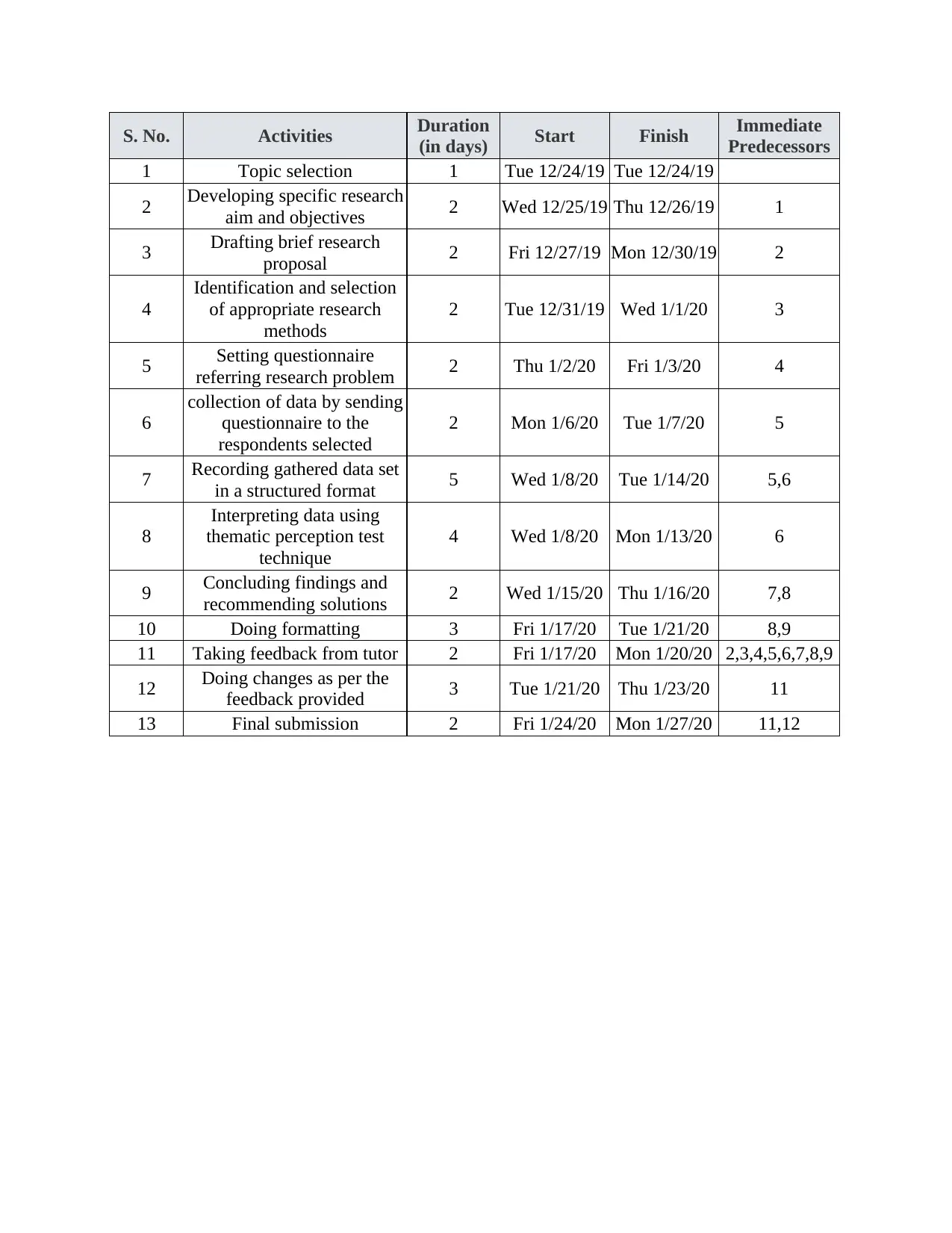
S. No. Activities Duration
(in days) Start Finish Immediate
Predecessors
1 Topic selection 1 Tue 12/24/19 Tue 12/24/19
2 Developing specific research
aim and objectives 2 Wed 12/25/19 Thu 12/26/19 1
3 Drafting brief research
proposal 2 Fri 12/27/19 Mon 12/30/19 2
4
Identification and selection
of appropriate research
methods
2 Tue 12/31/19 Wed 1/1/20 3
5 Setting questionnaire
referring research problem 2 Thu 1/2/20 Fri 1/3/20 4
6
collection of data by sending
questionnaire to the
respondents selected
2 Mon 1/6/20 Tue 1/7/20 5
7 Recording gathered data set
in a structured format 5 Wed 1/8/20 Tue 1/14/20 5,6
8
Interpreting data using
thematic perception test
technique
4 Wed 1/8/20 Mon 1/13/20 6
9 Concluding findings and
recommending solutions 2 Wed 1/15/20 Thu 1/16/20 7,8
10 Doing formatting 3 Fri 1/17/20 Tue 1/21/20 8,9
11 Taking feedback from tutor 2 Fri 1/17/20 Mon 1/20/20 2,3,4,5,6,7,8,9
12 Doing changes as per the
feedback provided 3 Tue 1/21/20 Thu 1/23/20 11
13 Final submission 2 Fri 1/24/20 Mon 1/27/20 11,12
(in days) Start Finish Immediate
Predecessors
1 Topic selection 1 Tue 12/24/19 Tue 12/24/19
2 Developing specific research
aim and objectives 2 Wed 12/25/19 Thu 12/26/19 1
3 Drafting brief research
proposal 2 Fri 12/27/19 Mon 12/30/19 2
4
Identification and selection
of appropriate research
methods
2 Tue 12/31/19 Wed 1/1/20 3
5 Setting questionnaire
referring research problem 2 Thu 1/2/20 Fri 1/3/20 4
6
collection of data by sending
questionnaire to the
respondents selected
2 Mon 1/6/20 Tue 1/7/20 5
7 Recording gathered data set
in a structured format 5 Wed 1/8/20 Tue 1/14/20 5,6
8
Interpreting data using
thematic perception test
technique
4 Wed 1/8/20 Mon 1/13/20 6
9 Concluding findings and
recommending solutions 2 Wed 1/15/20 Thu 1/16/20 7,8
10 Doing formatting 3 Fri 1/17/20 Tue 1/21/20 8,9
11 Taking feedback from tutor 2 Fri 1/17/20 Mon 1/20/20 2,3,4,5,6,7,8,9
12 Doing changes as per the
feedback provided 3 Tue 1/21/20 Thu 1/23/20 11
13 Final submission 2 Fri 1/24/20 Mon 1/27/20 11,12
⊘ This is a preview!⊘
Do you want full access?
Subscribe today to unlock all pages.

Trusted by 1+ million students worldwide
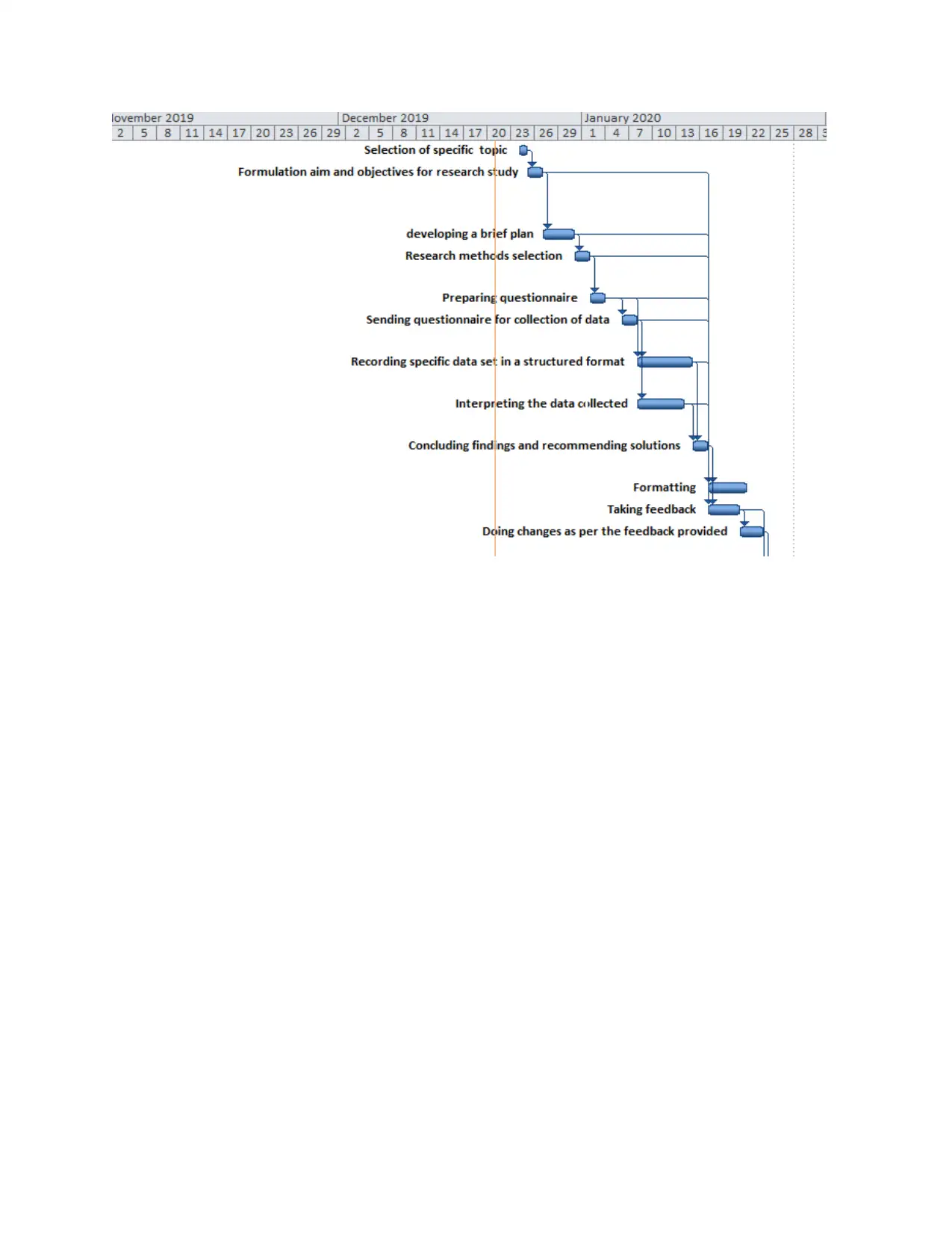
Paraphrase This Document
Need a fresh take? Get an instant paraphrase of this document with our AI Paraphraser
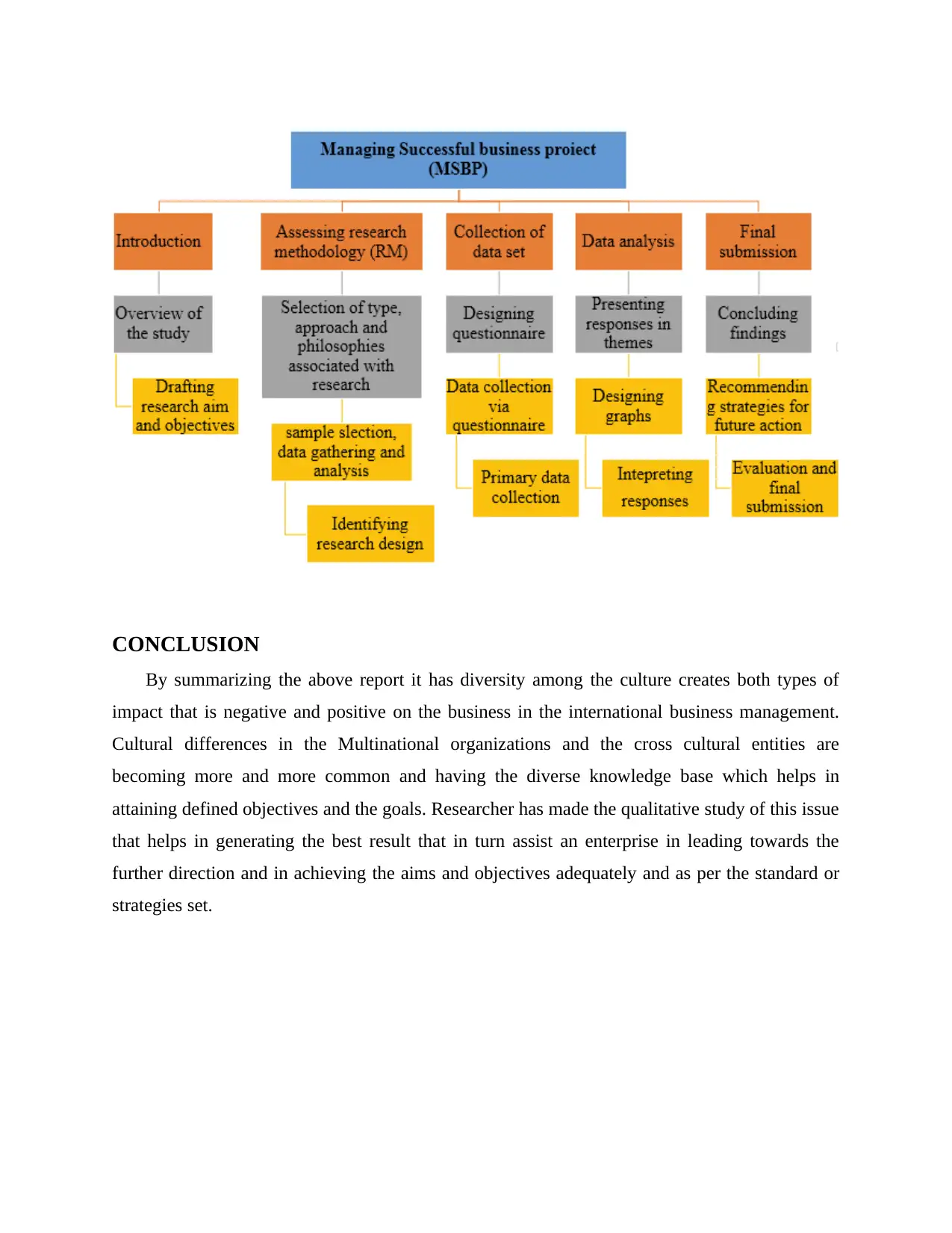
CONCLUSION
By summarizing the above report it has diversity among the culture creates both types of
impact that is negative and positive on the business in the international business management.
Cultural differences in the Multinational organizations and the cross cultural entities are
becoming more and more common and having the diverse knowledge base which helps in
attaining defined objectives and the goals. Researcher has made the qualitative study of this issue
that helps in generating the best result that in turn assist an enterprise in leading towards the
further direction and in achieving the aims and objectives adequately and as per the standard or
strategies set.
By summarizing the above report it has diversity among the culture creates both types of
impact that is negative and positive on the business in the international business management.
Cultural differences in the Multinational organizations and the cross cultural entities are
becoming more and more common and having the diverse knowledge base which helps in
attaining defined objectives and the goals. Researcher has made the qualitative study of this issue
that helps in generating the best result that in turn assist an enterprise in leading towards the
further direction and in achieving the aims and objectives adequately and as per the standard or
strategies set.
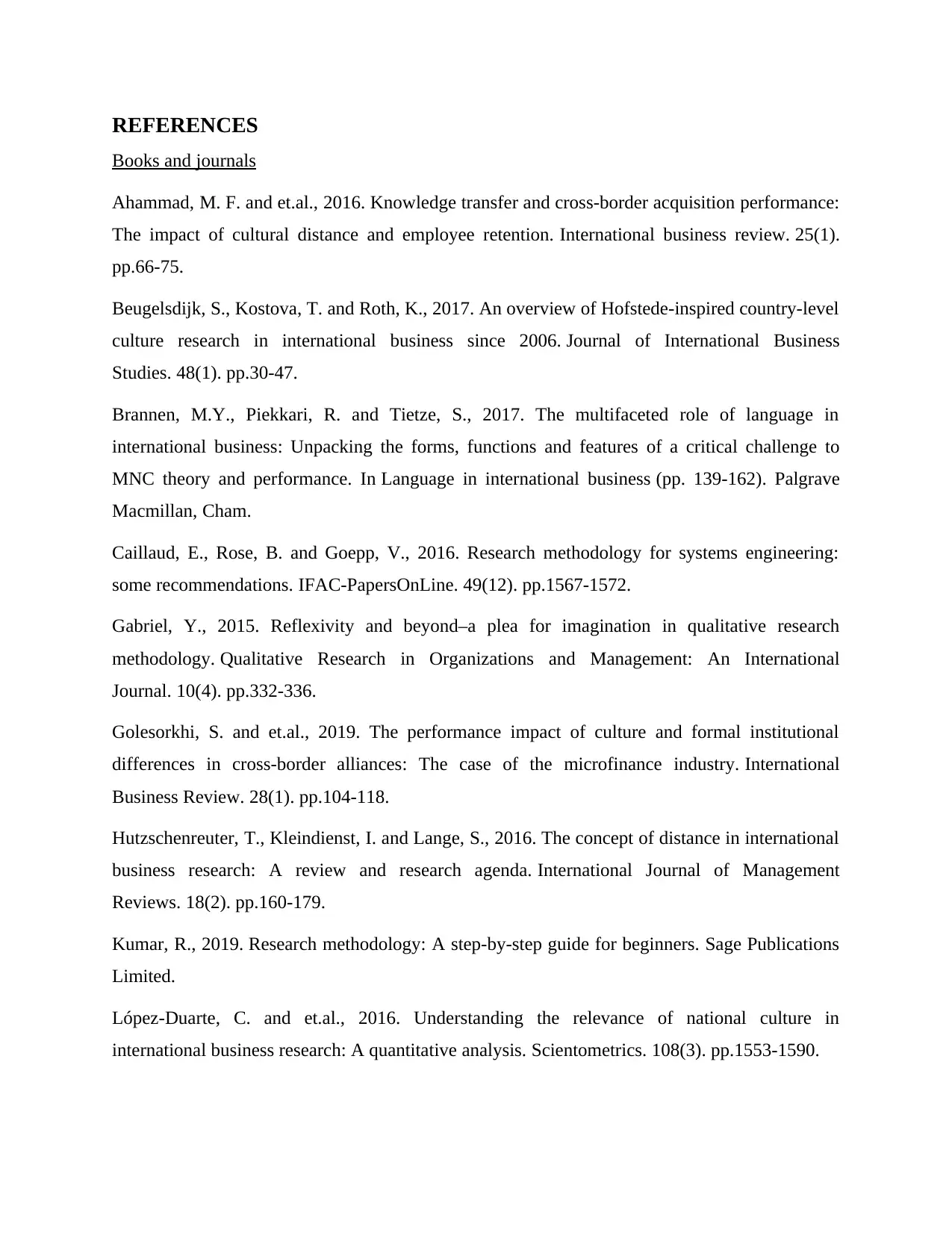
REFERENCES
Books and journals
Ahammad, M. F. and et.al., 2016. Knowledge transfer and cross-border acquisition performance:
The impact of cultural distance and employee retention. International business review. 25(1).
pp.66-75.
Beugelsdijk, S., Kostova, T. and Roth, K., 2017. An overview of Hofstede-inspired country-level
culture research in international business since 2006. Journal of International Business
Studies. 48(1). pp.30-47.
Brannen, M.Y., Piekkari, R. and Tietze, S., 2017. The multifaceted role of language in
international business: Unpacking the forms, functions and features of a critical challenge to
MNC theory and performance. In Language in international business (pp. 139-162). Palgrave
Macmillan, Cham.
Caillaud, E., Rose, B. and Goepp, V., 2016. Research methodology for systems engineering:
some recommendations. IFAC-PapersOnLine. 49(12). pp.1567-1572.
Gabriel, Y., 2015. Reflexivity and beyond–a plea for imagination in qualitative research
methodology. Qualitative Research in Organizations and Management: An International
Journal. 10(4). pp.332-336.
Golesorkhi, S. and et.al., 2019. The performance impact of culture and formal institutional
differences in cross-border alliances: The case of the microfinance industry. International
Business Review. 28(1). pp.104-118.
Hutzschenreuter, T., Kleindienst, I. and Lange, S., 2016. The concept of distance in international
business research: A review and research agenda. International Journal of Management
Reviews. 18(2). pp.160-179.
Kumar, R., 2019. Research methodology: A step-by-step guide for beginners. Sage Publications
Limited.
López-Duarte, C. and et.al., 2016. Understanding the relevance of national culture in
international business research: A quantitative analysis. Scientometrics. 108(3). pp.1553-1590.
Books and journals
Ahammad, M. F. and et.al., 2016. Knowledge transfer and cross-border acquisition performance:
The impact of cultural distance and employee retention. International business review. 25(1).
pp.66-75.
Beugelsdijk, S., Kostova, T. and Roth, K., 2017. An overview of Hofstede-inspired country-level
culture research in international business since 2006. Journal of International Business
Studies. 48(1). pp.30-47.
Brannen, M.Y., Piekkari, R. and Tietze, S., 2017. The multifaceted role of language in
international business: Unpacking the forms, functions and features of a critical challenge to
MNC theory and performance. In Language in international business (pp. 139-162). Palgrave
Macmillan, Cham.
Caillaud, E., Rose, B. and Goepp, V., 2016. Research methodology for systems engineering:
some recommendations. IFAC-PapersOnLine. 49(12). pp.1567-1572.
Gabriel, Y., 2015. Reflexivity and beyond–a plea for imagination in qualitative research
methodology. Qualitative Research in Organizations and Management: An International
Journal. 10(4). pp.332-336.
Golesorkhi, S. and et.al., 2019. The performance impact of culture and formal institutional
differences in cross-border alliances: The case of the microfinance industry. International
Business Review. 28(1). pp.104-118.
Hutzschenreuter, T., Kleindienst, I. and Lange, S., 2016. The concept of distance in international
business research: A review and research agenda. International Journal of Management
Reviews. 18(2). pp.160-179.
Kumar, R., 2019. Research methodology: A step-by-step guide for beginners. Sage Publications
Limited.
López-Duarte, C. and et.al., 2016. Understanding the relevance of national culture in
international business research: A quantitative analysis. Scientometrics. 108(3). pp.1553-1590.
⊘ This is a preview!⊘
Do you want full access?
Subscribe today to unlock all pages.

Trusted by 1+ million students worldwide
1 out of 13
Related Documents
Your All-in-One AI-Powered Toolkit for Academic Success.
+13062052269
info@desklib.com
Available 24*7 on WhatsApp / Email
![[object Object]](/_next/static/media/star-bottom.7253800d.svg)
Unlock your academic potential
Copyright © 2020–2026 A2Z Services. All Rights Reserved. Developed and managed by ZUCOL.





